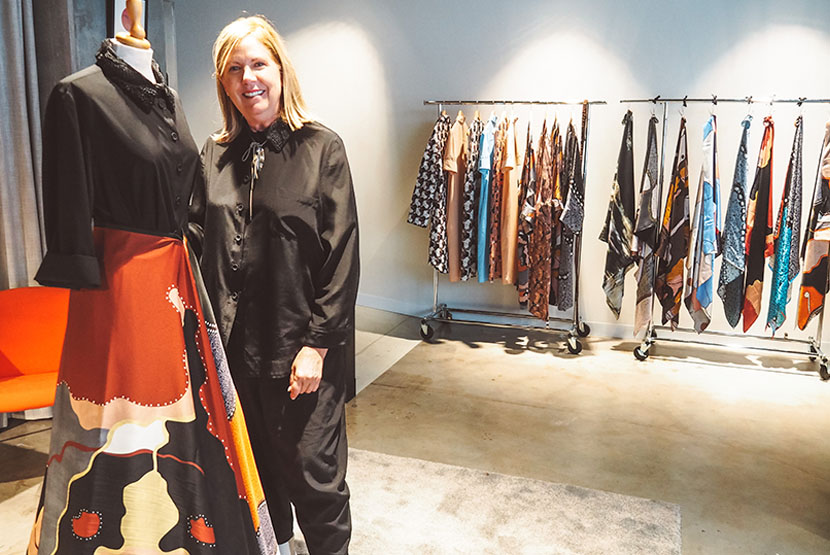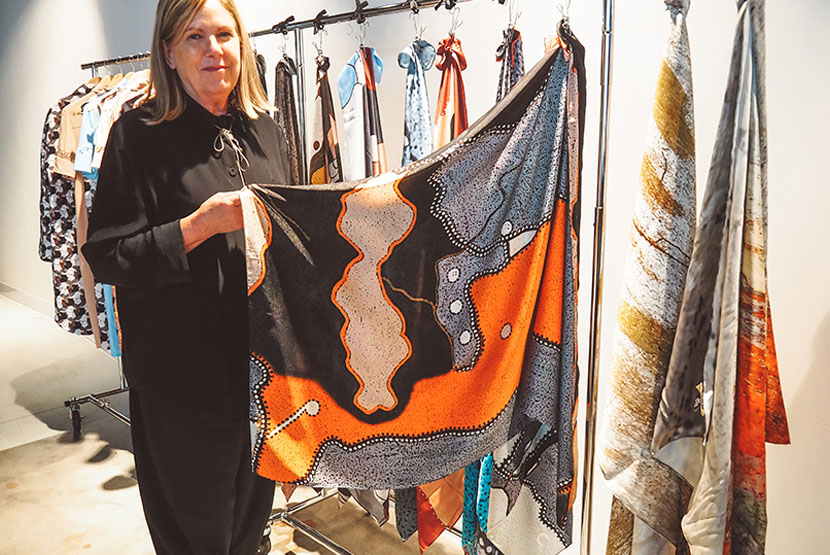The First Nations fashion brand putting informative conversations at its centre
First Nations fashion brand Ngali was a notable standout during Melbourne Fashion Week (MFW), and its presence in Docklands is now permanent after moving into its new Melbourne Quarter studio.
Founded by Wiradjuri designer Denni Francisco, Ngali is built around not only showcasing the work of First Nations artists but also about creating conversations – something she already saw taking place at MFW.
“We were really looking forward to having more young First Nations people involved so they could shadow the professionals, like the makeup artists, creative directors and stylists,” Ms Francisco said.
“But we also took on a lot of non-First Nations volunteers and what that provided fantastically was this intersection of them being able to learn more about First Nations and what it means to volunteer for a First Nations brand. We could have these conversations about who we are and create a culturally safe environment for everyone.”
As well as having people help on the day, six First Nations artists were also involved in painting magnificent, show-stopping artwork on boots that were provided by retail store Country Road.
These boots currently sit in the studio, ready to be marvelled at.
Ms Fanscisco first launched the brand in 2018 after feeling like she was missing a creative output in her life, and while she deliberated over whether it was the solution she was looking for, she soon realised the potential it could have in sharing a bigger message.
“I recognised that fashion is an easy entry for people to find out about our culture and Country, and it does start conversations,” she said.
This idea then soon developed into collaborating with First Nations artists and expanding the reach of their work through showcasing them on the clothing.
“It is all about translating the work, rather than just taking them as they are and putting them onto fabric,” Ms Francisco said.
“It’s a translation piece because every First Nations artwork has the story of the artist involved and it’s not really our story to tell, but we can translate it in such a way that the artists agree upon and that is respectful to their work and story.”
This vision to collaborate is at the centre of everything Ms Francisco does now, but it was her intention from the start with Ngali translating to “us” or “we” in a number of Aboriginal languages.
“We do more together, and the brand’s byline is also ‘together we create’, and that is around the whole concept of when people come together to make something happen, it really is fantastic,” she said.
Ngali is currently showcasing its latest collection Miya, which translates to “together”, and while a new collection also means new pieces, Ms Francisco is set on still incorporating pieces from older collections.
Incorporating sustainable practices and sourcing materials ethically is something Ms Francisco is really conscious about, and it comes from her drive to continue to put care for Country first.
“The garments themselves are on a journey and we don’t really have a stop and start point where we just do something for one season only,” she said.
“Having pieces from the last collection paired with something else in the new collection reduces the concept of how many clothes we need to have. Having less and having more versatility is really important.”
The Ngali studio is open from Tuesday to Friday, from 10am till 4pm, and visitors can now have a chance to look at the latest collection, and the beautifully crafted scarves that are a key part of the brand.
But with the brand’s name only on the rise after their runway in Milan Fashion Week and MFW, and a list of future runways to come, a phone call through to the studio before visiting is the best way to ensure someone will be on hand to take visitors through the works.
Ngali studio is located at 24 Aurora Lane, Docklands. •
For more information: ngali.com.au

Police search after motorbike stolen from Docklands









 Download the Latest Edition
Download the Latest Edition